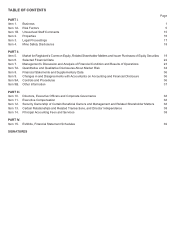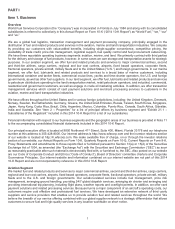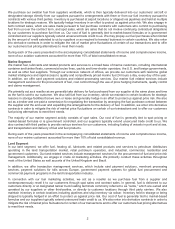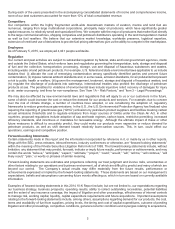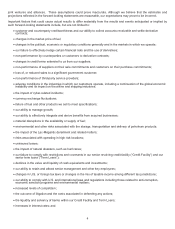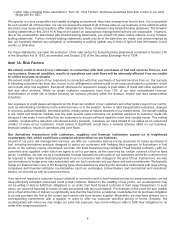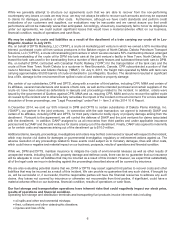World Fuel Services 2014 Annual Report Download - page 15
Download and view the complete annual report
Please find page 15 of the 2014 World Fuel Services annual report below. You can navigate through the pages in the report by either clicking on the pages listed below, or by using the keyword search tool below to find specific information within the annual report.10
If we fail to comply with laws or other government regulations applicable to our operations, we could suffer
penalties or costs that could have a material adverse effect on our business.
We are required to comply with extensive and complex laws and other regulations at the international, federal, state and
local government levels relating to, among other things:
• the transportation, handling and delivery of fuel and fuel products;
• the operation of fuel storage and distribution facilities;
• workplace safety;
• fuel spillage or seepage;
• environmental protection;
• consumer and data protection;
• payment card industry data security standards;
• government contracting and procurement;
• anti-trust and other applicable competition laws;
• anti-money laundering rules and regulations;
• regulatory reporting and licensing requirements; and
• hazardous waste disposal.
If we fail to comply with these laws or regulations, we could be subject to substantial fines or penalties or to civil or criminal
liability. In addition, compliance with existing and future laws regulating the delivery of fuel by barge, truck or railcar, fuel
storage terminals and underground storage tanks that we own or operate may require significant capital expenditures and
increased operating and maintenance costs. To the extent that we use third parties in our operations, we are also subject
to the risk that we would be held accountable for the failure of these third parties to comply with the laws and regulations of
the U.S. and various international jurisdictions. Any significant fines and costs incurred as a result of such regulations could
have a material adverse effect on our business and results of operations.
Our business is dependent on the ability to obtain financing to meet our capital requirements and fund our future
growth, which may be particularly difficult to obtain if there is volatility in the credit or capital markets.
We rely on credit arrangements with banks, suppliers and other parties as a significant source of liquidity for capital requirements
not satisfied by operating cash flow. Any inability to obtain credit as and when we need it on commercially reasonable terms or at
all, such as in the event there is a substantial tightening of the global credit markets or a significant reduction in supplier trade
credit, could have a negative impact on our business, financial condition, and cash flows, as well as our future development and
growth. Furthermore, if we are unable to obtain debt financing and instead raise capital through an equity issuance, existing
shareholders would be diluted. Even if we are able to obtain debt financing, the restrictions creditors may place on our operations
and our increased interest expense and leverage could limit our ability to grow.
Reduced sales to our government customers could adversely affect our profitability.
U.S. and foreign government budget constraints and the scheduled withdrawal of armed forces from Afghanistan are expected
to result in a decrease in defense spending, which in turn could cause a significant reduction in sales and related profit in our
government services business. Furthermore, profitability associated with our government services business may fluctuate
significantly from time to time as a result of the commencement, extension or completion of existing and new government
contracts. As a result of complex logistics and extended payment terms for our government customers, sales of products and
services to such customers generally carry higher margins than sales to other customers. Accordingly, a decrease in
government sales could contribute disproportionately to a reduction in our gross margin and profitability and such decrease
could be sudden. The loss of a significant government customer or a material reduction in sales to government customers
could adversely affect our business, financial condition, results of operations and cash flows.
Changes in the market price of fuel may have a material adverse effect on our business.
Fuel prices have been extremely volatile in the recent past, may be volatile in the future and depend on factors outside of
our control, such as:
• global economic conditions;
• changes in global crude oil and natural gas prices;
• expected and actual supply and demand for fuel;
• geopolitical conditions;
• laws and regulations related to environmental matters, including those mandating or incentivizing alternative energy
sources or otherwise addressing global climate change;
• changes in pricing or production controls by various organizations and oil producing countries;


